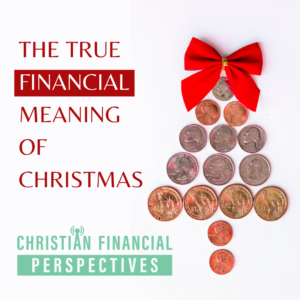Click below to listen to Episode 104 – The True Financial Meaning of Christmas
Subscribe: Apple Podcasts | Google Podcasts | Spotify | Amazon Music | Stitcher | RSS | More
The True Financial Meaning of Christmas
Bob and Shawn discuss meaningful, financial giving recommendations on this episode, including Donor Advised Funds, donating to a food bank, or giving coats to a homeless shelter. Unfortunately, for many, consumerism and materialism has become the true meaning of Christmas. Instead of celebrating the birth of our Lord through giving, Christmas has turned into a time of financial stress and burdens. Instead, it should be a time of peace and joy as God intended it to be.
Has the true meaning of Christmas been hijacked by Black Friday and Cyber Monday deals? Or, are you still seeing the true meaning while still enjoying giving to friends and family, giving to charities, and supporting the poor? It’s time for America to again find the true financial meaning of Christmas where it’s truly about joy, meaningful giving and the gift of God’s son.
HOSTED BY: Bob Barber, CWS®, CKA®
CO-HOST: Shawn Peters
Mentioned In This Episode
Want to ask a question about your specific situation? Schedule a complimentary 15 minute phone call.
EPISODE TRANSCRIPT
[INTRODUCTION]
Welcome to “Christian Financial Perspectives”, where you’re invited to gain insight, wisdom and knowledge about how Christians integrate their faith, life and finances with a Biblical Worldview. Here’s your host Christian Investment Advisor, Financial Planner, and Coach, Bob Barber.
[EPISODE]
Bob:
Well, hello, Shawn. Here we are just a couple weeks away, a week away, from Christmas.
Shawn:
About a week, about 10 days.
Bob:
I can’t believe it. I’ll tell you. Time goes by so fast. Next year, we’re gonna be going into 2022. I remember when it turned to the year 2000, and now we’re going 22 years later. So we got three twos in next year.
Shawn:
Thankfully, this next year coming up is not the year 2000 where all of our computers stopped working and all of technology and planes crash to the ground cause they couldn’t fly anymore. So thankfully, that won’t happen. Well, we’re not planning on that for next year.
Bob:
My wife can tell you in the year 2000, that’s when we were living out on 10 acres on the east side of 35 here in New Braunfels, and we had a little mini farm, and that very night at about right at midnight, I went all the way out to the edge of our property, where you can turn the breaker on and off and it turned off everything. So at midnight I snuck out there and flipped the breaker, everything went off and I go, there it is. everything’s gone.
Shawn:
All right, I’m gonna have to ask Jenna to verify if she remembers that.
Bob:
Girls were all screaming like, oh. So welcome to 104th podcast. And as always, Bob has a tendency, which is me, to pick hard subjects, but this is a subject I think really needs to be talked about. We talk about the true meaning of Christmas in the Christian community a lot. We understand what the true meaning of Christmas is. It’s about the birth of our savior. It’s not about consumerism, but today we’re gonna talk about the true, financial meaning of Christmas. And the scripture I picked – lo and behold – I go to my Bible app today and that was the scripture, the one that I picked today. Yeah. And I picked this several days ago before I put the podcast together. So I think it’s interesting during this Christmas season that that scripture is the scripture today. And this is one I picked and it’s from Matthew 6:19-21 says, “Do not store up for yourselves treasures on earth, where moths and vermin destroy and where thieves break in and steal, but store up for yourselves treasures in heaven where moths and vermin do not destroy and where thieves do not break in and steal. For where your treasure is there your heart will be also. That’s a good scripture. It’s a good one, always, when it comes to finances for anyone to read. I saw a quote when I was researching today’s subject talking about the true financial meaning of Christmas is that Americans have commercialized Christmas and worry way too much about what to get for others, spending money, and what they desire for themselves, where Christmas should be about the birth of Jesus, giving to charity and the less fortunate. So, , I’ll put you on a spot a little bit here, but I told you I’ll be asking you this. Okay. And it’s kind of the easy question, but what is that true meaning of Christmas?
Shawn:
Well obviously, we’ll get into a little more details on this later, but when it comes down to what is the true meaning Christmas. It’s about the fact that God sent his only son to this earth to die for our sins, to pave a way back for us to not just be redeemed from our sins, but to be adopted into God’s family, because Jesus was the only one that could do that. And so Christmas, of course, is a celebration of when Jesus was born. So, it’s kind of the start of that part of the story. And then obviously, Easter is a whole other topic.
Bob:
And sometimes I wonder, I mean, we celebrate Easter, but it seems like Christmas is so much more celebrated here in America. Maybe that is because of consumerism, where Easter’s not. Easter’s really the biggest celebration.
Shawn:
It really is. I mean, the birth of Jesus is the culmination of so many years. I mean, if I remember correctly, I apologize to any Bible scholars if I get it wrong, but I believe it was about 400 years from the last book of the Old Testament -The last time God had spoke through a prophet – and it was about 400 years from the last prophet that God had on earth until the birth of Jesus. And so, I know looking back at the history, like the Israelites had been, basically, it seemed like God was silent.
Bob:
400 years is a long time.
Shawn:
A long time. It’s a long time. Yeah. I mean, our country is not very old, like maybe for other countries that 400 years isn’t that long when they have thousands of years of history. But especially for us in United States, 400 years is long time . Yeah. But what was really interesting was my pastor actually, this past Sunday, he talked about how, and it wasn’t necessarily exactly for this purpose, but it about how just because God seems to be silent doesn’t mean that he’s not active. It doesn’t mean that he’s not hearing you. And it doesn’t mean that he doesn’t have a plan that he’s enacting. And so, after 400 years of silence, the reason why Christmas is so impactful and meaningful is it’s because all of these promises that God had made about birth of a Virgin, the birth of the savior would be through a Virgin birth, and all of these things. And so you start all of a sudden having all of these promises fulfilled exactly as God said that they would be fulfilled. And then throughout the rest of Jesus’ life, all of these prophecies that come true, but that birth, right then, it’s like all of these things coming true. And all of a sudden God went from seeming like he was silent and distant to I told you I had a plan. I’m doing it.
Bob:
I think about the meaning of Christmas, I think of the imaculate conception. I mean, and that had to do…
Shawn:
How hard was that for Mary and Joseph? Oh, think about for them. I’m sure there were people in their family and their friends that are like, I mean, they even talk about Joseph was gonna quietly divorce his wife. But yet, God sent an angel to Joseph as well to say, she’s telling the truth, this is my son, and you need to stay by her.
Bob:
The true meaning of Christmas to me is truly giving. It’s God giving us his son and to come down and live amongst all of us bozos. I mean, to really see what we go through. And he went through what we went through and lived a sinless life. So, the meaning of Christmas is where it starts. So, I was thinking about this at Christmas. It’s just so much going on during Christmas. What’s your favorite memory of a gift at Christmas, and why did that mean a lot to you?
Shawn:
Sure. So, I actually talked about this with Jenna. We did our special episode, but I think obviously it’s relevant today as well. But for me, it was surprisingly something called K’nex and some people may not know about that. Everybody knows Lego. It’s kinda like Legos, but Legos is a bunch of blocks, whereas K’nex was this idea of having these different link rods and connectors. And so, you could create a lot more functional things with K’nex, especially because some of the kits would even include little motors. You can connect these little plastic chains and stuff too. And the reason why I remember that so much is it has nothing to do with it being super expensive. But what I loved about it is I got to create and build these things. And I know for my parents, my mom even not that long ago mentioned something, remember, you used to like K’nex you think Rhonan would them? Yeah, but he’s a little too young still. I think maybe in a couple years. But she and my dad even enjoyed watching me with that because they got to see like this creative side and doing stuff with my hands.
Bob:
It’s like that funny saying we know in Christmas Vacation, it’s the gift that keeps on giving.
Shawn:
Yeah. it does. Cause I would build something. I’d play with it for a while. Then I’d tear it all down and build something again.
Bob:
So when you’re giving a gift, you think about that? That gift is meaningful. It is the gift that can keep on giving. I was telling you yesterday, I remember two of my favorite gifts as a child. It was baseball mitt, and it was a football. And I used to wait for my dad to come home every day. As soon as my dad would get home, poor guy, I mean, he been working all day. I was like, Dad! He had a glove too. I’d give him the glove, I’d get a glove. And It meant that gives me time with my dad and playing pitch, and like the movie “Field of Dreams”, that to me is such precious memories.
Shawn:
I love that. You say that’s one of your favorite memories because now – I’m sure your dad was tired. But now, when I come home, and my son Rhonan is like, “Dada!” He runs to the door and then he wants to gimme a hug and he wants me to pick him up. And then he’s like, “Dada airplane!” And wants me to hold him horizontal, puts his arms out, and I have to run around the house like he’s flying, and then I put him down and I’m a little tired. He’s like, “Okay, Again!” Okay. Like, so yeah, I’m tired. But also, I’m not gonna tell him no, like that brings so much joy, no matter how tired I feel like I am when your child is asking you play with me, spend time with me. And you’re like, Okay.
Bob:
So, it’s those gifts that really don’t cost a lot. But it’s the gifts, like you say, that keep on giving. I was telling you, Jenna, she goes out and she gets my favorite drink and my favorite snacks, all this and puts all this together for me. And that’s my favorite every year.
Shawn:
All the coconut themed everything?
Bob:
Yeah. You know how I like coconut? So we’ve talked about the mean of Christmas and our favorite memories of gifts, but I’m already thinking, now today, we’re talking about the financial meaning of Christmas and I’m just thinking, what do you think, Shawn? What do you think about the financial meaning of Christmas is?
Shawn:
When we think about this from the non-Christian or we call it, I guess you’d call it secular point of view. I think there’s a lot of expectations, anxiety, and stress all focused around this because everywhere you look is about buying new stuff. One of the things I remember Jenna had even mentioned was, oh, stocking stuffers at $25, $40, $50 for one item. It’s like, what? And in my opinion, that’s crazy. That much to put something in a stocking. So people just get so wrapped up and like, I have to spend all of this money and I have to buy all these gifts, or they get into Black Friday or Cyber Monday – a new washer and dryer that you don’t need, but oh, but it’s on sale. So I gotta get it. I gotta brace the crowds or fight on. Hopefully, I get it online.
Bob:
So there’s several things I think of with the financial meaning of Christmas. You think of the Black Friday sale. The Cyber Monday. And then now they’re having all these other online…
Shawn:
And it’s not even necessarily stuff you’re getting for gifts. That’s just stuff that maybe you want.
Bob:
So they’ve taken away, around Christmas time, the true meaning of Christmas which is about Jesus Christ and what he did. And they’ve refocused it all on commercial.
Shawn:
And what’s even sadder, if you think about it is, even when it was focused on gifts, like, oh, getting gifts for people now it’s not even necessarily getting gifts for other people. It’s oh, treat yourself. Get something for yourself. Oh, you know that new TV that you wanted cuz you’re 50 inch isn’t big enough. Now you need a 60 inch or a 70 inch. And it’s not even gifts for other people.
Bob:
Oh. When think about the financial meaning of Christmas, it sounds like to me, and as I was putting this podcast together, it has really become a financial burden that’s full of stress and debt instead of peace and joy the way God intended it to be.
Shawn:
Summarizing the commercialization of Christmas in America.
Bob:
It’s hijacking. I mean, consumerism has hijacked the true meaning of Christmas. I found the definition of American consumerism that kind of goes with this. And really, the goal is to create a sense of wellbeing in people and get happiness from attaining consumer goods and material possessions. So the more stuff I can get, the happier I will be.
Shawn:
Which sounds like the definition of son. It’s fun for a time, for a short period of time, but it’s not lasting. And it leaves you feeling empty. And it’s really the same thing. The goal of consumerism is the opposite of what an actual, joyful, fulfilling life is in the Lord because you’re trying to fill this void. You’re trying to fill this hole with something that is never going to be able to do that.
Bob:
The stuff is always just gonna give temporary happiness, you know? And it was interesting. I was writing this down and redefining this consumerism goal where I could say it easily on the podcast. I thought about myself and I have to admit, and I’ve even noticed this. After I’ve done a lot of shopping or bought something big and new, I feel like I’ve accomplished something. But really, have I? And that’s weird. We’re gonna go out. We’re gonna shop a lot, and we’re gonna go have a nice meal. I’m not saying there’s anything wrong with that.
Shawn:
If it goes beyond just like a job well done, like you’re getting gifts for people and hey, if I had a budget and I came well under that budget. So, I mean, to an extent some accomplishment, like something you might do at work. But it’s not gonna last, obviously that feeling isn’t gonna last that long.
Bob:
So, it’s really time for America to reach back, isn’t it?
Shawn:
Yeah. It’s time for us to find the true financial meaning of Christmas, where it’s truly about joy and meaningful giving and the gift of God’s son.
Bob:
Yeah. God never intended for Christmas to be about materialism. It’s not supposed to be about materialism, but somewhere along the way, we got caught up in that from the American consumerism.
Shawn:
So how can we turn this materialistic thinking in America, behind Christmas, right on its head.
Bob:
I think we’re gonna look at scripture.
Shawn:
I agree. Let’s go. Let’s go to a scripture. So we’re gonna read Matthew 25:34-40 is the NIV in case anyone wants to read along. Verse 34, “Then the king will say to those on his right, come you who are blessed by my father. Take your inheritance. The kingdom prepared for you since the creation of the world. For I was hungry and you gave me something to eat. I was thirst and you gave me something to drink. I was a stranger and you invited me in, I needed clothes and you clothed me. I was sick and you looked after me. I was in prison and you came to visit me. Then the righteous will answer him. Lord, when did we see you hungry and feed you or thirsty and give you something to drink? When did we see you with a stranger invite you in or needing clothes and clothe you? When did we see you sick or in prison and go to visit you?” And this is my favorite part. Verse 40. “The king will reply, Truly, I tell you whatever you did for one of the least of these brothers and sisters of mine, you did for me.”
Bob:
This is a scripture we can apply directly to Christmas. We need to think of the financial part of Christmas as a way to help the poor and the sick and the less fortunate, all those things that were you just named in scripture, because we helped the poor less fortunate and feed them. So we’re doing it for Christ.
Shawn:
So Bob, what are some ideas that we can give our listeners today?
Bob:
First of all, I know this podcast is just coming out 2, 3, 4 days before Christmas. So I’m like, okay, I’ve already done all my Christmas shopping 90% of it. Now, it’s guys like me that usually wait till the 23rd or 24th. I’m walking around kinda with my head cut off.
Shawn:
You’ve never gone by Walgreens on Christmas Eve and grabbed some stuff.
Bob:
Never. One of the things is I want you to think of not just Christmas as one day, but think of Christmas as giving and God giving his son. Think of it as year round. It’s especially a good time right now to think. Here’s an idea. Open up a donor advised giving fund for you and the family, and fund it with maybe half of that Christmas budget that you spent and then get with your kids and grandkids and discuss how you’re going to give that money away that you’ve put into a donor advised fund.
Shawn:
Interesting. So, Bob, what is a donor advised fund? I know you probably have a few examples.
Bob:
I do. And we’ve had a few podcasts on donor advised funds, but a donor advised fund is a nonprofit fund.
Shawn:
OK. So the first one that we have for our listeners, if you guys wanna write this down or we’ll have it on the website, too. The National Giving Foundation, which is NCFgiving.org.
Bob:
And that’s one of the podcasts where I had Ryan Assunto on, and he talks about what a donor advised fund is. So a donor advised fund, think of it as a giving fund. Also think about, I’m not sure what ministries I wanna give to or what I wanna give to right now, you can open up this giving fund, like through the National Christian Foundation, NCFgiving.org and there’s also waterstone.org and thesignatry.com, several other donor advised funds that we’ll have on our website. Okay. So you open up this fund and then you can fund it with whatever amount you wanna fund it with.
Shawn:
Like if you may a donation to your church, right. You can donate wherever you want to.
Bob:
Exactly. You can donate stocks to it, appreciated assets, most anything to it. Now, once you’ve donated that to that donor advised fund, you can’t take it back, but the difference in versus giving the funds to your church, where your church is just going to use all that. When you give to a donor advised fund, the money can sit there for a while until you decide who you want to give it to, whether that be one ministry or multiple ministries. And that’s where you get with the family. And you get your kids involved in giving and saying, we’ve got so $5,000 in this, or we’ve got $50,000 or $500,000 in this donor advised fund. And we can decide what ministries we wanna give to.
Shawn:
So to maybe summarize it, would you say it’s similar to putting money into a savings account where you’re putting that money in there and you’re not necessarily spending it right now, but you’re earmarking that the savings account, but by putting it in a donor advised fund, from a tax perspective, monetary perspective, it’s the same as if you had already donated to your church, with the difference being that it doesn’t have to be spent immediately. Like say, a family wanted to save up to a certain amount and then donate to a clean water project and it cost $10,000 to do a new well. You could wait to donate until, maybe over a few years or however long it’s gonna take, there’s enough in there now we can now give the money to this charity and they can build a new well somewhere that needs it.
Bob:
You named it exactly right. Whether it’s a well or giving to the food bank, as long as it’s 501c3 and it’s truly a nonprofit organization. Now remember, it’s a savings account for giving, but you can’t take the money back.
Shawn:
Well, of course, yes. It’s as good as if you gave it to the church, the only difference is once it’s been given, it doesn’t then have to exit the fund to a charity until you’re ready.
Bob:
That’s right. That’s correct.
Shawn:
So you could save throughout the year. Jenna and I talked about how you save up for for Christmas throughout the year instead of, “Oh no, we’re gonna go into debt. We’ll just save up throughout the year.” Well, this could be part of that. And something you could even talk to your family about is that, hey, every month we’re putting this much into our donor advised fund. So then at Christmastime, this is who we’re gonna be giving to.
Bob:
And as you hear this podcast, you could go online right now to either NCFgiving.org or there’s another organization I’ve used a lot over the years called Waterstone in Colorado Springs, waterstone.org. Yep. Or the Signatry, which I’ve had Bill High as a guest on one of my podcasts too, called the signatry.org. We’ll have this on our website. You could open up any of these online. You hear this today. You can literally have a giving fund up and running within 15 minutes, and then you can even fund it with a credit card as long as you pay it off.
Shawn:
Yeah. But we might recommend funding with an account.
Bob:
Funding with your bank account, it can be funded. And you can to give this is a gift to your family. Say that we’ve opened up a family giving fund. And we’re going to decide as a family what ministries to give to. It gets your whole family involved in ministry. I love that. That’s a strong, easy idea you can do quickly that’s really thinking outside the box.
Shawn:
So some other ideas of meaningful giving during the Christmas season, which some of these could be done obviously through the donor advised funds as well. But just some more specific examples. Donor advised fund is more of the instrument that maybe you could give with. But what do you give to? So some examples, give the gift of water. I mentioned a little earlier, there are a lot of wonderful nonprofits that are what are called clean water projects. They go in and they dig wells and maybe other things that tie to that for a community or a village to have clean drinking water, which here in the United States, we think, what are you talking about? I mean, we just turn the tap on. Like, we’re very blessed, but there are a lot of areas in the world that they don’t have access to clean drinking water and might have to walk miles to go get water every day just to be able to drink. Another one might be giving the gift of food. So there are food banks, probably at least one, in a short drive distance from where you are. I know in our area here, there are multiple wonderful food banks, but there also might be – I know sometimes like our church at Thanksgiving and Christmas – we actually all get together and we coordinate with food banks and other places to find families in the area who are either undernourished or they are hungry and we get to deliver food to them and invite them to church. You could do something like that. Another one might be helping a homeless person. If you see them and during this Christmas season, have some extra coats and clothing in your car, and if you see one, give a coat or give ’em a gift card to a restaurant. Don’t give them your leftovers you’re gonna give to Goodwill anyway, like give them a new coat.
Bob:
Or go buy that good meal and offer them, you know? Just stop and offer it. Homeless people are not homeless cause they choose to be. I mean, maybe 1%, but 99% of them, they’re not choosing this. I really feel for them. We’ve had Eventide Funds on our program before, and they’re very much into helping homeless people because they said so much of that is caused from schizophrenia.
Shawn:
It’s a lot of mental health.
Bob:
Yeah. And that’s what caused it. Another thing that doesn’t cost anything to do during the season is visit the hurting and lonely. And I’ll tell you, nursing homes are full of people needing a visit. When I go see my mom, I see so many of these people sitting by themselves, and I love to go pat them on the back and just say, hi, how are you today? And it makes their day
Shawn:
Yeah. It doesn’t have to be your grandma or your aunt.
Bob:
Yeah. It can be someone else. Invite a lonely person that you may know that’s gonna be by themselves over to your home for Christmas dinner or any other time.
Shawn:
You might have a friend who is in the military or someone who is newer to the area, and they’re not married. They don’t have a significant other of some kind, and they’re far away from family. If you know that they’re alone, invite ’em. Make sure they have somewhere to spend a holiday.
Bob:
I still remember a couple years ago when we invited some of the military over to have Christmas dinner with us. Yeah. And it was very meaningful. See, it’s not about the size and the cost of the gift, the financial cost that matters, but it’s really about the love that’s behind it.
Shawn:
Yeah. Well, it makes me think of, Bob, you may know the exact verse, but remember when Jesus was talking to the Pharisees and he described them as whitewashed tombs because they did all these things. They prayed on the street corner. They put ash on their face when they were fasting. They did all these things because they wanted people to see, oh, look how holy they are. Look how loyal to God they are. Look at all of this. And yet they have their reward because they did it in public. But yet on the flip side, those who cleaned their faces if they’re fasting, those who prayed in secret to the Lord, they have their reward because they did it for the Lord not to be seen, and that comes back to it’s the heart. And as we read earlier, Matthew 25:40 says, “The king will reply, Truly, I tell you whatever you did for one of the least of these brothers and sisters of mine, you did for me.” And during this Christmas season, think about a gift that creates lasting memories and joy with you, your children, grandchildren, and others.
Bob:
Think about what is this gift about? How will it help someone, and is it really needed and really think about those things heavily.
Shawn:
Yeah. What gifts can you remember were the most meaningful from past Christmases yourself? We talked about ours. Why do you remember it?
Bob:
It is interesting that you say that because I was thinking can remember just five things that you got last Christmas or the Christmas before? Just five.
Shawn:
And obviously I’m sure most households average more than five gifts per person per year. And when you asked me that, we were kind of looking through what we wanted to talk about today, and even now even having thought about it more, I can’t think of that many. And it’s not that I shouldn’t have even received the gifts in the first place, but it’s just to kind of drive home the point that it’s not ultimately about the stress and the potential debt and all these things you might struggle with if that’s something that’s been a struggle for you for Christmas. It doesn’t need to be that way, because no matter how many gifts you get, people aren’t going to be able to remember all of those gifts, but what they will remember, and my family loves – because my wife, Jenna, has been doing a photo book for the year of our son, Rhonan, like every year, since he was born – and that is the thing that my side of the family, and I know Rachael, they keep that. They remember that. What does it cost? It takes some time on Jenna’s part. It’s $20-$30 for getting the book printed, but it means more $500. If someone said, Hey, do you just have pictures of Rhonan? Do you have pictures of your grandson? You’re like, oh, well, here’s my book from year one, year two, year three, year…. Like you know where they are and you can show ’em to people.
Bob:
The way to really think about giving is how will a gift be remembered in the long run? I mean, here you and I are talking, I don’t think I could list five things I got several years ago. I can remember some of the gifts my children got me because they know dad likes food, but when they go to the effort of fixing something or making something for me, it means more to me.
Shawn:
Cause you could buy all of those things easily for yourself, but it’s the fact that someone took the time to remember, I know he likes this. It’s more than just what they put together, it’s the fact that they know you, and they care about you.
Bob:
So how can you make your giving truly impactful? We’re coming to the end here. How can you make your giving impactful and remembered in the long run? As we come down to the end here, think about Christmas. I mean, Christmas is just one day.
Shawn:
But we shouldn’t think of the giving of Christmas as just one day. Turn around and think of it as a lifestyle change for, for you and your family. That’s the true meaning of Christmas. the ultimate gift of Christmas is the gift from God who sent his one and only son, Jesus Christ. He was born out of a miraculous conception from a Virgin mother, untainted by the sin of mankind. He lived among us so he could feel what we feel, while remaining sinless throughout his life. Then as a perfect sinless man, he bore our sins on the cross and defeated death on the third day when he rose again. All who accept him receive the gift of eternal life and are adopted into the family of God as his children.
Bob:
So I gotta ask you as we end today’s podcast, do you know this savior? Do you know Jesus Christ as your personal savior? Christmas season is a great time. There’s just no better time of the year than to accept this free gift that you cannot earn, but Jesus has given you. And if you’re not sure who this Jesus is, and life has become all about you and materialism that just really never fills that void inside of you, we would love to bring you to that personal relationship with God. You can stop where you are in your car. You can keep driving and say, Lord I need you, but if you wanna talk to someone about it. It’s never too late and it’s never too early in life to give your heart to Christ and watch him transform your life and turn from happiness into joy. There’s no amount of money or Christmas gifts made of material things that will truly feel that void. It’s always gonna be, “I just gotta have a little bit more and a little bit more,” because that’s what materialism does. It does not bring lasting joy, but Christ does. We are here if you would like to give us a call at (830) 609-6986, or you can text that number as well. We don’t want you walking another day without Christ as the center of your life. Merry Christmas.
Shawn:
Merry Christmas.
[CONCLUSION]
That’s all for now.
We invite you to listen to all of our past episodes covering many financial topics from a Christian Perspective. To make sure you don’t miss any of Bob’s upcoming episodes you can subscribe to Christian Financial Perspectives on iTunes, Google Play Music, Spotify, or Stitcher. To learn more about integrating your faith with your finances, visit ciswealth.com or call 830-609-6986.
[DISCLOSURES]
Investment advisory services offered through Christian Investment Advisors Inc dba Christian Financial Advisors, a registered investment advisor registered with the SEC. Registration as an investment advisor does not imply a certain level of skill or training. Comments from today’s show are for informational purposes only and not to be considered investment advice or recommendations to buy or sell any company that may have been mentioned or discussed. The opinions expressed are solely those of the hosts, Bob Barber and Shawn Peters, and their guests. Bob and Shawn do not provide tax advice and encourage you to seek guidance from a tax professional. While Christian Financial Advisors believes the information to be accurate and reliable, we do not claim or have responsibility for its completeness, accuracy, or reliability.














